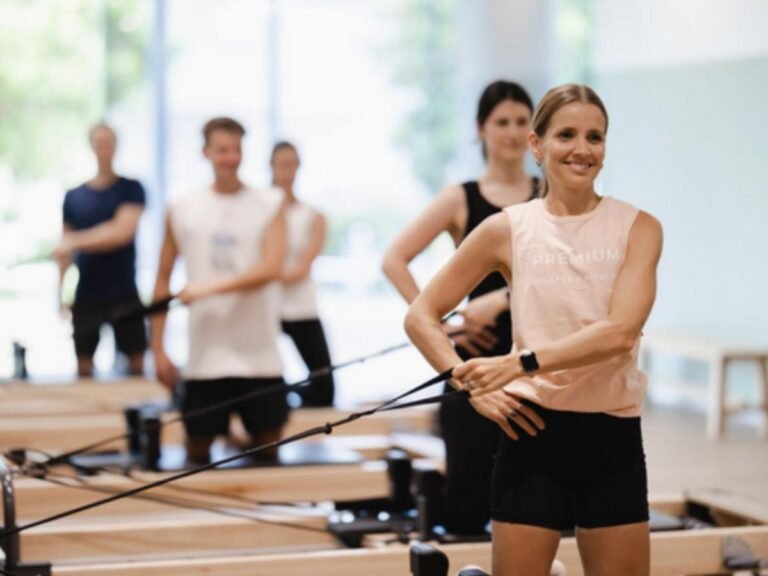
Pilates is more than just a workout; it’s a holistic approach to fitness that focuses on strengthening the core muscles, improving flexibility, and enhancing overall body awareness. Developed by Joseph Pilates in the early 20th century, this exercise method has gained immense popularity due to its effectiveness and versatility.
The Core Connection
At the heart of Pilates lies a deep emphasis on core strength. The controlled and precise movements engage not only the superficial muscles but also the deep stabilizing muscles, creating a solid foundation for a stronger, leaner physique.
Burning Calories the Pilates Way
Contrary to the misconception that Pilates is a low-intensity workout, it can be surprisingly effective in burning calories. The focus on controlled movements and continuous engagement of muscles keeps the heart rate up, contributing to calorie burn and, subsequently, weight loss.
Say Goodbye to Boredom: Variety in Workouts
One of the biggest hurdles in maintaining a regular exercise routine is boredom. Pilates offers a variety of exercises that can be modified to suit different fitness levels, keeping your workouts exciting and engaging.
Mind-Body Harmony: Stress Reduction through Pilates
Beyond physical benefits, Pilates promotes mental well-being by encouraging mindful movement. The synchronization of breath and movement helps reduce stress, fostering a positive mindset that is crucial for successful weight loss.
Adaptable for All Fitness Levels
Whether you’re a fitness enthusiast or a beginner, Pilates is adaptable to various fitness levels. The versatility of Pilates exercises ensures that everyone can find a routine that challenges them without overwhelming them.
Pilates vs. Traditional Cardio: A Smarter Approach?
While traditional cardio exercises have their merits, Pilates offers a smarter approach to fitness. It combines strength training with cardiovascular benefits, providing a comprehensive workout that targets multiple aspects of health.
Building Lean Muscles, Not Bulk
Unlike some forms of exercise that focus on building bulk, Pilates sculpts long, lean muscles. This not only contributes to a more aesthetically pleasing physique but also enhances functional strength.
Flexibility Redefined: The Pilates Effect
Flexibility is a key component of Pilates. The fluid movements and stretches improve flexibility, reducing the risk of injuries and enhancing overall mobility.
The Long-Term Impact on Weight Management
Pilates isn’t just a quick fix; it’s a sustainable approach to weight management. By building a strong foundation and promoting overall well-being, Pilates sets the stage for long-term success in maintaining a healthy weight.
Pilates Equipment: Do You Need It?
While Pilates equipment can add variety and challenge to your workouts, it’s not a necessity. Many Pilates exercises can be done with just a mat, making it an accessible and affordable option for all.
Expert Tips for Effective Pilates Sessions
To maximize the benefits of Pilates, consider these expert tips: focus on form, be consistent, listen to your body, and gradually increase intensity. Consistency is key to seeing positive changes in your body.
Common Misconceptions About Pilates
Dispelling myths is crucial to understanding the true potential of Pilates. It’s not just for dancers or the flexible; it’s a workout for everyone looking to improve their strength, flexibility, and overall fitness.
Real People, Real Results: Pilates Success Stories
Explore inspiring stories of individuals who have transformed their bodies and lives through Pilates. Realize that you, too, can achieve remarkable results with dedication and the right mindset.
Conclusion: Embrace the Pilates Lifestyle
In conclusion, Pilates offers a holistic approach to fitness that goes beyond the conventional notions of exercise. It’s not just about losing weight; it’s about building a healthier, more balanced lifestyle. So, why wait? Embrace Pilates, transform your body, and embark on a journey to a healthier you!
FAQs About Pilates for Weight Loss
Is Pilates suitable for beginners?
Pilates is suitable for all fitness levels, including beginners. Start with basic exercises and gradually progress as your strength and flexibility improve.
How often should I do Pilates for weight loss?
Aim for at least 3 sessions per week to see noticeable results. Consistency is key in reaping the benefits of Pilates for weight loss.
Can Pilates replace traditional cardio workouts?
While Pilates offers cardiovascular benefits, it’s advisable to complement it with traditional cardio exercises for a well-rounded fitness routine.
Do I need special equipment for Pilates?
While Pilates equipment can enhance your workouts, many exercises can be done with just a mat. Equipment is optional and not a requirement.
Will Pilates help with stress management?
Absolutely! The mindful movements in Pilates, combined with controlled breathing, contribute to stress reduction and improved mental well-being. Ready to give it a try?
Embark on your Pilates journey today and discover the transformative power of this unique exercise method. Your body and mind will thank you for it!